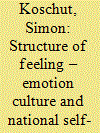| Srl | Item |
| 1 |
ID:
146668


|
|
|
|
|
| Summary/Abstract |
This paper analyses opinions of political self-sacrifice amongst Tibetan refugees, and explores their meaning for wider debates on the evolving relationship between religion and politics in the Tibetan national struggle. This is a particularly pertinent question at present, given the recent prevalence of self-immolation in Tibet and connected debates about whether such protests are religious or political issues. Does the increase of self-sacrificial political methodology indicate a secularisation process of the Tibetan movement, as some have suggested, or is it simply reflective of the natural fluidity of religion's political influence? This paper supports the latter position and seeks to explore the nature of this dynamic relationship, including the positioning within it of the Dalai Lama.
|
|
|
|
|
|
|
|
|
|
|
|
|
|
|
|
| 2 |
ID:
152105


|
|
|
|
|
| Summary/Abstract |
Why do individuals sacrifice themselves to defend a nation-state? This article emphasises the link between emotion and culture by investigating the affective reproduction of culture in world politics. Building on the tradition of Émile Durkheim, it introduces the concept of emotion culture to IR. Emotion cultures are understood as the culture-specific complex of emotion vocabularies, feeling rules, and beliefs about emotions and their appropriate expression that facilitates the cultural construction of political communities, such as the nation-state. It is argued that emotions provide a socio-psychological mechanism by which culture moves individuals to defend a nation-state, especially in times of war. By emotionally investing in the cultural structure of a nation-state, the individual aligns him/herself with a powerful cultural script, which then dominates over other available scripts. The argument is empirically illustrated by the case of the so-called Japanese kamikaze pilots.
|
|
|
|
|
|
|
|
|
|
|
|
|
|
|
|